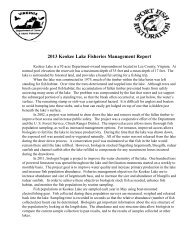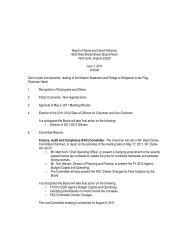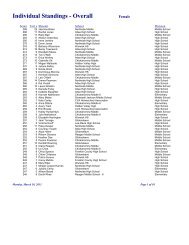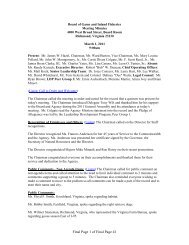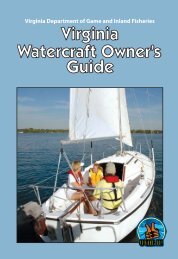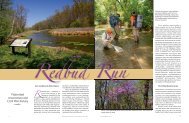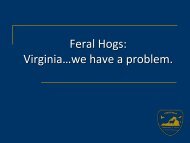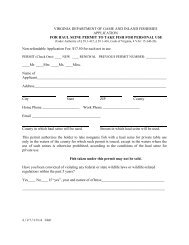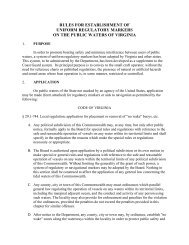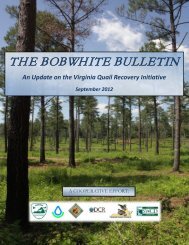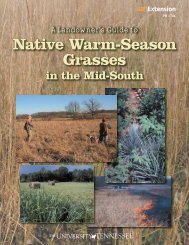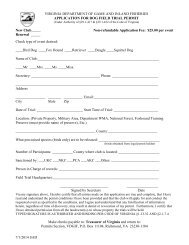2013 Virginia Freshwater Fishing & Watercraft Owner's Guide
2013 Virginia Freshwater Fishing & Watercraft Owner's Guide
2013 Virginia Freshwater Fishing & Watercraft Owner's Guide
You also want an ePaper? Increase the reach of your titles
YUMPU automatically turns print PDFs into web optimized ePapers that Google loves.
<strong>2013</strong> <strong>Fishing</strong> Regs & WOG 11-15-12_Layout 1 11/16/12 1:02 PM Page 60Safe OperationEnforcementBoating laws are enforced primarily by ConservationPolice Officers employed by VDGIF.These officers have full police powers andhave the right to lawfully stop and boardyour boat at any time to check for properregistration and required safety equipment.Unlawful Acts• Reckless operation of boat, water skis oraquaplane.• Operating, while intoxicated, a boat,aquaplane or water skis.• Operating or giving permission tooperate an unregistered motorboat.• Operating or giving permission to operatea boat with an expired Certificate ofNumber.• Operating a motorboat with numberimproperly displayed.• Operating a boat with unauthorizednumber displayed.• Failing to carry the Certificate of Numberon board or refusing to show it to inspectingofficers.• Operating a registered motorboatmore than 90 days in <strong>Virginia</strong> withoutregistering it here.• Failing to report a change of address of aregistered motorboat owner within 15days.• Failure to report loss or abandonment ofa registered boat within 15 days.• Failure to exhibit lights as required by lawbetween sunset and sunrise.• A vessel operator failing to stop, renderassistance, give name and address at thescene of an accident or failing to file anaccident report within 10 days.• Towing a water skier not wearing a USCGapproved life jacket without an observerin the boat.• Operating a motorboat without amuffled exhaust or with a cutout on theexhaust.• Failure to obey regulatory watermarkers.• Operating a motorboat or skis in an areadesignated for swimming.• Engaging in snorkeling or scuba diving inwaters open to boating without displayinga flag (no boat shall approach closerthan 25 yards when flag displayed).Speed LawsNo Wake1. “No Wake” is defined as the slowestpossible speed required to maintainsteerage and headway.2. It shall be unlawful to operate anymotorboat greater than no wake speedin areas marked with regulatory “NoWake” buoys.3. It shall be unlawful to operate anymotorboat greater that no wake speedwhen within 50 feet or less of docks,piers, boathouses, boat ramps, andpeople in the water. This definition doesnot prohibit the pulling of a skier with arope of less than 50 feet, nor a personaccompanying the motorboat (wakesurfing) provided the motorboat ispropelled by an inboard motor.Slacken SpeedOperators shall reduce speed to avoidendangering persons or property by theeffect of the motorboat’s wake whenapproaching or passing vessels under way,lying to, at anchor, or made fast to the shore;or, when approaching or passing piers,docks, or boathouses; or when approachingor passing persons in the water or usingwater skis or surfboards.Safe SpeedA safe speed is a speed less than the maximumat which the operator can take properand effective action to avoid collision andstop within a distance appropriate to theprevailing circumstances and conditions.In establishing a safe operating speed,the operator shall take into account:visibility, traffic density, ability to maneuverthe vessel (stopping distance and turningability), background light at night, proximityof navigational hazards, draft of the vessel,limitations of radar equipment, and thestate of wind, sea, and current.Unsafe PracticesIt is unlawful to allow any person to ride orsit on the bow, gunwales, transom, or on thedecking over the bow of the vessel whileunder power unless such motorboat isprovided with adequate guards or railing toprevent passengers from falls overboard.Passengers or other persons aboard a watercraftmay occupy these areas of the vessel tomoor or anchor the watercraft, to cast off, orfor any other necessary purpose.Boating EducationInformationThe VDGIF provides a free classroom boatingsafety course, Boat <strong>Virginia</strong>. This courseis available throughout <strong>Virginia</strong> during theyear. The VDGIF also supports NASBLAapproved boating courses offered by theUSCG Auxiliary (USCGAux) and the U.S.Power Squadrons (USPS). There are severalinternet courses that meet <strong>Virginia</strong>’s BoatingSafety Education Requirement (see informationabout this requirement on page 61).For a complete up-to-date list of boatingsafety education course offerings and boat-Did you get your <strong>Virginia</strong> Lifetime Boater’s Card?Our new Lifetime <strong>Virginia</strong> Boater’s Card is available to those who meet the boating safetyeducation requirement. This durable, drivers license styled card is available for a fee of$10.00. If you meet any of the below listed requirements – you may apply today!• Completed a NASBLA approved boating safetycourse (U.S. Power Squadrons, U.S. CoastGuard Auxiliary, other states’ boating safetycourses, or internet courses)• Completed a <strong>Virginia</strong> Challenge Exam• Have lost your original Boat <strong>Virginia</strong> card• Possess/once possessed a valid license tooperate a vessel issued to maritime personnelby the United States Coast Guard or a marine certificate issued by the Canadian government• Possess a Canadian Pleasure Craft Operator’s Card• Possess/once possessed a commercial fisherman registrationApplications can be found on the Department’s website atwww.dgif.virginia.gov/boating/education/.60<strong>2013</strong> <strong>Virginia</strong> <strong>Freshwater</strong> <strong>Fishing</strong> & Boating <strong>Guide</strong>



